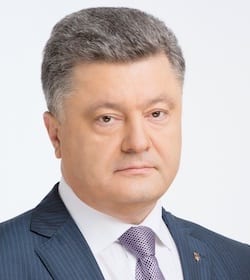Ukraine held a presidential election on March 31, with almost 63% registered voter turnout – slightly higher than average when compared to previous elections. Early results and exit polls show TV comedian and political novice Volodymyr Zelensky won the first round but, fell short of an absolute majority. Incumbent President Petro Poroshenkofinished second and the two candidates will face each other in a run-off scheduled for April 21. The race promises to be extremely tense with stakes very high, as the country continues to fight off a hybrid war with Russia in its eastern regions and remain on a successful yet incomplete pro-European reform path.
According to the National exit poll, as well as the official vote count at the time of this writing, the results are as follows:
| Candidate | National Exit Poll | Official result (99.92% counted) |
| Volodymyr Zelensky | 30.6% | 30.23% |
| Petro Poroshenko | 17.8% | 15.95% |
| Yulia Tymoshenko | 14.2% | 13.39% |
| Yuriy Boyko | 9.7% | 11.67% |
| Anatoliy Grytsenko | 7.1% | 6.91% |
| Ihor Smeshko | 6.5% | 6.04% |
The official count closely matches the exit poll, which suggests the election took place in a fair and transparent manner. The OSCE ODIHR Election Observation Mission in its Statement of Preliminary Findings and Conclusions recognized the election campaign as generally peaceful and competitive. The Central Election Commission is due to announce official results no later than April 10.
This campaign is remarkable because its frontrunner Zelensky, a famous comedian effectively exploited his satirical movie character – a school teacher turned president – in his presidential election bid. He carefully avoided major public and press engagements to keep his virtual image intact. He owes this victory in the first round to a successfully managed social media campaign, notably on Instagram, and a higher than usual turnout of voters from southern and eastern regions. At the same time, he benefitted from a lower turnout of Poroshenko supporters in western regions.
Poroshenko fell victim to numerous corruption scandals and voters’ traditional disillusionment with their political class. Ukrainians took for granted the incumbent’s successful leadership in handling Russia’s hybrid war in the East, taking Ukraine closer to Europe, and mobilizing a wide international coalition behind the country’s efforts.
What next?
The run-off election between Volodymyr Zelensky and Petro Poroshenko will take place April 21.
 |
 |
| Petro Poroshenko Incumbent President of Ukraine |
Volodymyr Zelenskyi Election frontrunner |
This will be an uphill battle for Poroshenko, as Zelensky beat him 2 to 1 in the first round and was ahead of him in pre-election opinion poll forecasts for the second round. So far, none of the “runners-up” in the presidential poll have come out to support Poroshenko, while Anatoliy Grytsenko explicitly urged his voters not to vote for the incumbent President. Pro-Russian voters supporting Yuriy Boyko are highly unlikely to support Poroshenko. Reaction of the remaining voters remains mixed, as Zelensky is positioning himself as an anti-corruption candidate of change.
For his part, Zelensky has promised to bring some clarity to his campaign ahead of the run-off, publicly promising to name key presidential appointments before the April vote – including his choice for Ministers of Foreign Affairs, Defense, and Head of the Security Services. The proposed Prime Minister seat “remains open,” as the post is proposed by a parliamentary majority, which will be formed after elections this autumn.
Companies doing business or exploring investment in Ukraine should recognize a high likelihood of turbulence in Ukrainian politics and prepare for a possible extended period of uncertainty until 2020. Two months after a new president is sworn into office, Ukraine will commence on what promises to be a hot parliamentary campaign, which will produce a new coalition government towards the end of the year. Likely shifting allegiances in the political landscape make the outcome of the parliamentary race hard to predict.
In the coming three weeks, we are certain to see active smear campaigns by the two opponents that might radically change the current situation. Unless the incumbent President comes up with moves that completely reverse current trends, Volodymyr Zelensky has a much stronger chance to become the next President of Ukraine than the incumbent. The irony, though, is that the incumbent president may lose to a man who plays the role of president in a TV series.
Who is Volodymyr Zelensky?
He is a skillful actor who is playing a high-stakes role on behalf of infamous Ukrainian oligarch Igor Kolomoisky. Once a major industrial and banking mogul, Kolomoisky has suffered heavy business blows in recent years following the government’s nationalization of bankrupt PrivatBank, multiple lawsuits against him in western courts, and a resulting loss of political clout in Ukraine. Sheltered from western law enforcement by Israel, Kolomoisky sees the elections as a chance to regain former political and economic influence.
Team: Zelensky has no experience in politics and lacks a strong political team. In the run-up to the first round, he’s been consulted by former Minister of Finance Oleksandr Danyliuk and former Minister of Economy Aivaras Abromavicius, both recognized reformers by the IMF and former investigative journalists turned MP Serhiy Leschenko, among others. His team is likely to be fitted primarily with disgruntled Poroshenko opponents as well as political opportunists of all types, potentially including well-known technocrats to secure support from the West and domestic skeptics.
First steps: Little is known about Zelensky’s policies (foreign, national security, economic, etc.). While he declares the promise of resisting Russia and maintaining the pro-European course, his ability to deliver is a point of major concern. His presidency may also come at a time of large-scale foreign debt payments due in 2019-2020. His widely perceived affiliation with Kolomoysky raises doubts about his declared pursuit of an anti-corruption agenda. One clear sign of where he stands will be to watch whether or not a new president makes changes in the National Bank leadership, which parliament is likely to block early on until the chamber’s make-up is changed after the autumn parliamentary election poll.
Opposition: With Zelensky as President, the parliamentary majority controlled by Poroshenko might quickly resort to imposing “checks and balances” by adopting impeachment legislation or limiting presidential authority in the Constitution. Western support of Ukraine will likely be suspended pending further clarity on Zelensky’s economic course and domestic political developments.
Security: Zelensky, if elected president, will inherit a deadlocked conflict in Ukraine’s east. This may come at a time when the EU and the US have their own distractions, while Moscow could use the momentum to test a new president in his early days in office by escalating pressure, thereby trying to extract more leverage from an inexperienced Ukrainian leader. Western governments will likely take back seats watching the evolution of Zelensky’s presidency. The Russia sanctions regime could eventually ease if Ukraine begins to cave to the Russians.
Economic: The markets will react with caution to Zelensky’s election. IFIs could put current programs on hold given uncertainty about further economic reforms and political developments. UAH devaluation is very likely if the IFIs get nervous and stop the flow of credits.